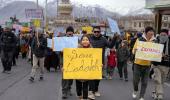'Ladakh has become a hollow UT.'
'Bureaucrats from Delhi rule Ladakh and there is no attention paid to the grievances of the people.'

When Prime Minister Narendra D Modi abrogated Article 370 the people of Kashmir were upset as it gave outsiders the right to buy land in the valley but in Ladakh, then a part of Jammu and Kashmir state, the people were overjoyed as they felt that the dominance of Kashmir over Ladakh would now be a thing of the past.
However, after Ladakh was spun off into a separate Union Territory, the euphoria over the abrogation of Article 370 did not last long. Ladakhis soon realised that they were now being ruled from New Delhi and did not have any say in the decision-making process.
They have since been protesting regularly to demand statehood and an end to direct rule by Delhi.
The person leading the protest is Sonam Wangchuk, the celebrated engineer and educator from Ladakh.
On Monday, September 30, 2024, night, Wangchuk, who led a padyatra from Ladakh to New Delhi with 200 people to press their demands, was detained by the police in the national capital.
That public sentiment in Ladakh clearly did not favour the ruling Bharatiya Janata Party was evident in the Lok Sabha elections, when the region elected Independent candidate Haji Hanifa Jan as its MP. The BJP's Tashi Gyalson came third, after the Congress' Tsering Namgyal.
"People should have the right to decide how they want to run their state," Haji Hanifa Jan tells Syed Firdaus Ashraf/Rediff.com.
Why was Songam Wangchuk detained?
On Monday night we reached the Delhi border (Singur) through our padyatra that began from Ladakh last month. We have been traveling 25 km daily by foot and there are around 150 people with us.
Unfortunately, the Delhi police did not allow us to reach Rajghat where we were going to end our yatra on October 2, the birthday of Mahatma Gandhi.
What is your demand and why have you come to Delhi?
We have a four point agenda.
Firstly, we want full statehood for Ladakh. After Ladakh became a Union Territory post the abrogation of Article 370 there is no democracy in Ladakh. Article 35A within Article 370 used to guard Ladakh's cultural identity and its land from being encroached by outsiders.
Secondly, we are demanding the Sixth Schedule of the Constitution to be brought in for Ladakh and safeguard our interests.
Thirdly, in the last five years there has been no recruitment of local people in jobs which are being generated in Ladakh. Therefore, we want a separate cadre to run the administrative services in Ladakh which must be run by the locals of Ladakh.
The fourth demand is to have environmental safeguards for Ladakh.
But were you not talking to the government about these issues earlier, for which Sonam Wangchuk had gone on hunger strike?
Yes, we were talking to the government, but this was before the general elections. Unfortunately, after elections, those talks have stopped.
Is there opposition to the power project that the government is planning to start in Ladakh which is going to supply electricity to Haryana?
Yes, this is also one of the issues we are protesting.
We want the Autonomous Hill Development Council to get its power back. The central government has snatched away all the powers of the Autonomous Hill Development Council.
This autonomous body had the right to decide on what needs to be done with the land of Ladakh and was run by local people. Now, we cannot do it after Ladakh became a Union Territory.
In the Budget session of Parliament, Ladakh was given additional districts and this move was welcomed by Sonam Wangchuk. What went wrong then?
We are demanding four points for Ladakh.
People should have the right to decide how they want to run their state. In the last five years, there has been no development in Ladakh in terms of hospitals. We have to go to Srinagar or Chandigarh for medical treatment.
Higher education is negligible in Ladakh and students have to go out of Ladakh to study.
When Article 370 was abrogated the people of Ladakh welcomed it stating that the hold of Srinagar would no longer be there. What went wrong?
It is true that 50 percent people of Ladakh demanded Union Territory status for Ladakh and they were happy with the development, but the other 50 percent of the population of Ladakh, which is Kargil area, were against a UT.
And now the situation is such that those who were daydreaming that Union Territory status would bring prosperity to the people of Ladakh have realised the bitter truth that no such thing happened.
Ladakh has become a hollow UT. Bureaucrats from Delhi rule Ladakh and there is no attention paid to the grievances of the common people.
Now, those 50 percent population of Ladakh who were happy to get UT status are also opposing this move.
We want Ladakh's development to happen for the good of the Ladakhi people and not the bureaucrats of Delhi.
What next for you all?
We have been struggling to get statehood for the last three years. We came to Delhi with a lot of expectations that we will get to meet senior leaders of government, but unfortunately nothing of the sort is happening.
Ladakh has got the second most unemployed youth in the country as jobs are not being given to the locals of Ladakh.
These are serious issues which we want to discuss with the government, but unfortunately we are detained by the Delhi police.
Did you request to meet Prime Minister Modi?
We have been requesting that we have to go back to the table and discuss Ladakh's status with the central government. This was going on before the elections, but now that has been stopped. We want the talks with central government to resume.
Ladakh is a border region with a volatile situation with China. Don't you think your protest could send out wrong signals?
We have always protested peacefully and have kept the country's interest in mind. We have been asking for a peaceful solution for Ladakh, but there is no response from the government.
We have always stood by the Indian Army whenever we have been called for the country's territorial issues.
All we are asking is that we be allowed to visit Jantar Mantar and Rajghat.
The least the government can do is talk to Sonam Wangchuk and other leaders who have come to Delhi after this long padyatra.










